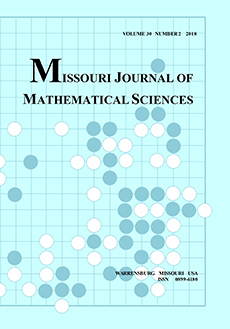Abstract
A fundamental result of calculus states that a function $f$ with a positive derivative $Df$ on an interval is increasing on that interval. This result follows directly from the Mean Value Theorem. We explore the extent to which the hypotheses of the Mean Value Theorem can be weakened and $f$ still shown to be increasing. Let $f$ be a continuous function on an interval $[a,b]$. By constructing counterexamples using Cantor-Lebesgue functions, we show that the assumption $Df > 0 \ a.e.$ does not imply that $f$ is increasing. We can, however, show that if $Df > 0$ except on a countable subset of an interval, then $f$ is increasing. We call this the Countable Exceptional Set Theorem. This theorem is generalized by the Goldowsky-Tonelli Theorem, which tells us that if $Df$ exists except on a countable subset of an interval and $Df > 0 \ a.e.$, then $f$ is increasing. We then show that if the exceptional set $S$ is uncountable, then we can construct a continuous function $f$ for which $Df > 0$ on $[a,b] \backslash S$, but for which $f(a) > f(b)$. The key item is that the exceptional set contains a perfect set. Moreover, this occurs whenever the exceptional set is uncountable. Thus, in a very natural sense, Goldowsky-Tonelli is a vacuous extention of the Countable Exceptional Set Theorem.
Citation
Stephen D. Casey. Richard Holzsager. "On Positive Derivatives and Monotonicity." Missouri J. Math. Sci. 17 (3) 161 - 173, Fall 2005. https://doi.org/10.35834/2005/1703161
Information




